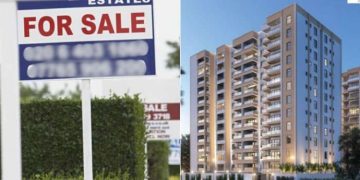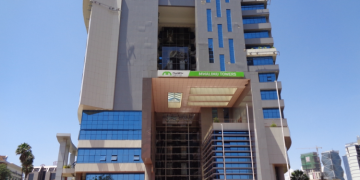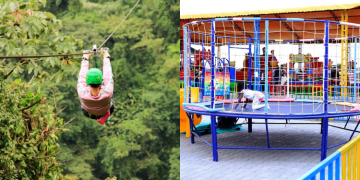While landlords in Europe and North America struggle with falling prices and mortgage pressure, Kenyan Landlords are cashing in.
A report by Hass Consults shows landlords in Kenya are selling houses and profiting handsomely in a market that’s remained resilient, with cash-based ownership, limited mortgage exposure, and one of the world’s strongest returns on residential property.
“Rental yields have the highest impact on property return,” the HASS Property Index notes in its 2025 report. “A rental yield of 10% is like delivering 10% returns.”
The report by Hass Consults shows Kenya outpacing all nine leading global property markets in 2025, driven by surging domestic demand, low mortgage dependency, and capital appreciation that dwarfs returns elsewhere.
According to the report, Kenya’s average residential property return for 2025 stands at 7.67%, comprising 2.03% capital growth and 5.64% gross rental yield.
That puts it ahead of the UK, France, and Australia, all of which posted lower combined returns
Since 2000, Kenya’s residential property prices have soared by 425% than five times their value, outstripping the U.S. (201%), France (151%), and Singapore (122%).
How Cash Is Driving the Market
Unlike Western housing markets, Kenya’s market remains largely unleveraged. Just 2% of homes in the country are mortgage-financed, compared to 70% in the U.S. and 90% in Switzerland.
Also Read: Research Reveals Cockroach Milk Is Three Times More Nutritious Than Cow’s Milk
That means when landlords sell, they’re walking away with real gains, not settling debt.
“Most homes are already owned outright with no rent, no mortgage, and no risk of default,” said HassConsult Co-CEO Sakina Hassanali during the launch of the report. “That makes our market extremely resilient.”
With capital appreciation at 7.8% in the year to June 2025, the highest of any market analyzed, and rental yields still above global averages at 5.5%, investors are rotating capital into higher-growth opportunities or diversifying their assets.
“When rental yields fall, as they have in many markets, landlords often sell their properties, so they can earn more from their capital in other assets, like stocks, startups, or even cattle,” the report notes.
The Rise of Kenya’s Middle Class and Off-plan Market
Kenya’s property boom is also boosted by the expanding middle class and a sharp increase in high-income earners.
Professionals typically rent while they pay in installments for off-plan developments, projects bought before completion.
This has created a booming off-plan market, where annual returns have hit an eye-popping 18.06% in 2025.
“Kenyan professionals rarely pay out to buy once they have that kind of money,” the report observes. “Instead, they rent and gradually move into ownership through off-plan installments.”
This has kept rental demand stable, especially for high-end detached homes, which have seen prices rise by 10.9% this year alone.
Even as global property markets have struggled, Kenya’s detached homes are gaining value.
Why the Global Market Is Faltering
Highly leveraged housing markets across the Northern Hemisphere are buckling under the weight of rising interest rates and aging populations.
From the U.K. to South Korea, central banks have raised rates to curb inflation, slashing buyer affordability.
Also Read: CBK Joins Globally Benchmarked Institutions with Prestigious Certification
According to the report, 2025 saw global housing prices slump in most markets, with Canada posting a -1.25% price drop, and France lagging at just 1.11% growth.
“Once borrowers face extra costs, their loan repayments can become unpayable,” the report explains. “They start to default, and banks put other properties up for sale to recoup the original loan. This drives property prices down.”
Kenya, insulated by its cash-driven market, has escaped the worst of these global financial tremors.
“These higher Kenyan property returns are based on the sales prices of completed properties and the resale of old housing stock,” the report reads. “But the main entry point for new Kenyan buyers is off-plan sales.”
Global Ranking
According to the report’s forecast of 2025 gross residential property returns, Kenya ranks competitively:
| Country | Capital Growth | Rental Yield | Total Return |
| South Africa | 3.13% | 10.55% | 13.68% |
| Ghana | 2.12% | 6.51% | 8.63% |
| Nigeria | 1.35% | 7.05% | 8.40% |
| Kenya | 2.03% | 5.64% | 7.67% |
| Uganda | 1.85% | 6.15% | 8.00% |
| UK | 1.21% | 4.61% | 5.82% |
| France | 1.55% | 4.54% | 6.09% |
| Australia | 1.21% | 3.56% | 4.77% |
“Rental Yields in 2023 ranged between 3.56% and 10.55% across the countries analyzed… The five key African countries analyzed had gross rental yields between 5 per cent and 11 per cent.”
In Kenya’s market, selling your house might just be the smartest investment decision you can make.
Follow our WhatsApp Channel and X Account for real-time news updates.










































































